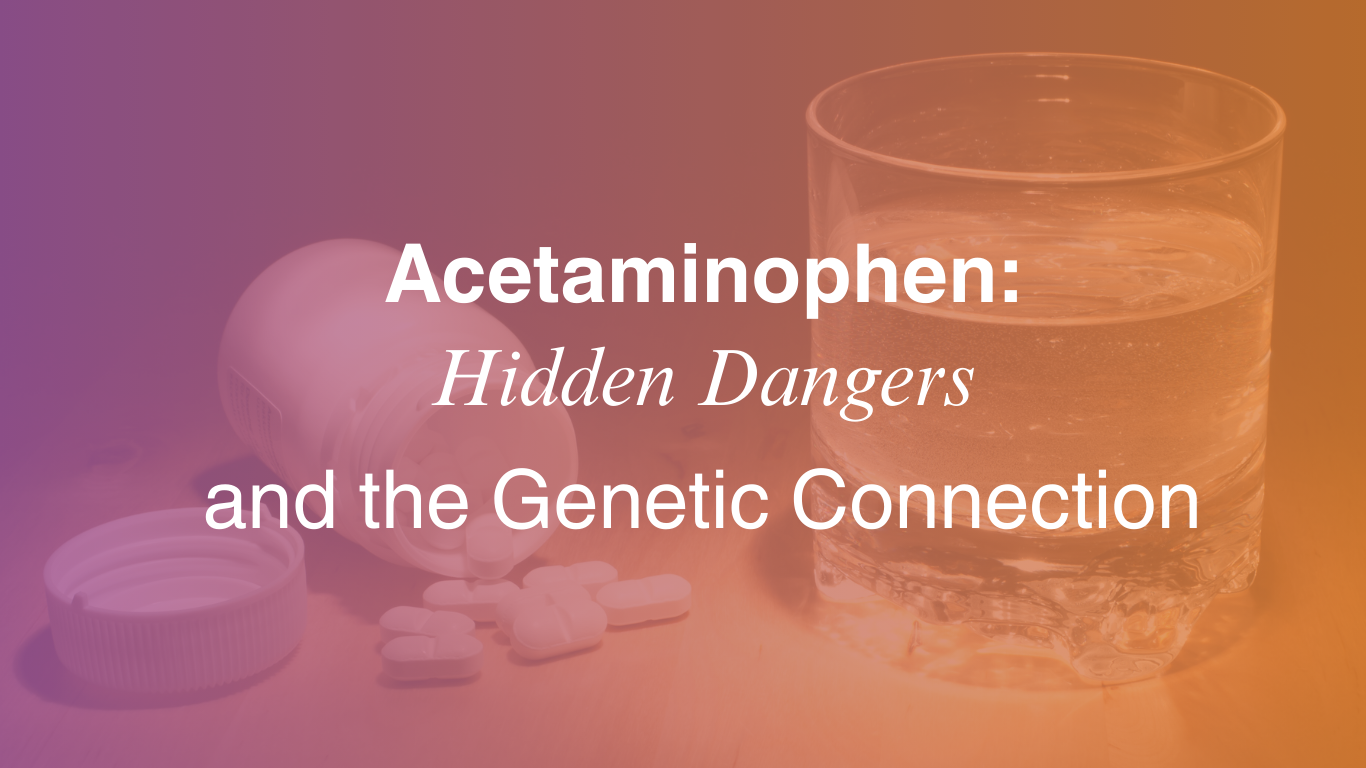
Acetaminophen: The Hidden Dangers and the Genetic Connection
For decades, acetaminophen has been marketed as the “safe” choice for pain and fever, even during pregnancy. But new research and national headlines are shining light on what functional medicine has warned for years: acetaminophen isn’t harmless, and for many, it may be harmful.
What the Science Is Showing
- A large systematic review of 46 studies (over 100,000 mother-child pairs) found that prenatal acetaminophen use is associated with higher risks of autism spectrum disorder (ASD) and ADHD in children¹
- A Yale School of Public Health review confirmed these associations and emphasized that acetaminophen crosses the placenta and directly affects fetal brain development²
- The U.S. Department of Health and Human Services (2025) is now considering formal warnings for pregnant women, highlighting just how serious this conversation has become³
On a biochemical level, acetaminophen is known to deplete glutathione, the body’s master antioxidant, leaving cells more vulnerable to oxidative stress.
Why Understanding Your Genetic Blueprint Matters
Not everyone processes acetaminophen the same way. Your genes control how well you detoxify, recycle antioxidants, and regulate brain chemistry. If these systems aren’t working at full strength, the risks of acetominophen exposure can be amplified. On our MaxGen report, under the Toxic Exposures section, you can even see if you carry genetic variants that make you more sensitive to acetaminophen specifically.
Key genetic pathways to consider include:
- Glutathione & Detox Genes (GSTM1, GSTP1, UGTs): These regulate how acetaminophen is neutralized and cleared. Some people naturally recycle glutathione less efficiently, making them more sensitive to oxidative stress.
- COMT and Neurotransmitter Genes: These genes help balance dopamine and serotonin. Since acetaminophen affects neurotransmitter pathways, people with certain COMT or serotonin variants may feel greater impacts on mood and focus.
- MTHFR and Methylation Genes: These influence detoxification and neurodevelopment. Reduced methylation capacity means the body has less buffer against chemical stressors.
This is why understanding your genetic blueprint is so important. Beyond the Toxins section, our report also includes CYP metabolism genes, which play a critical role in how your body processes a wide range of pharmaceuticals, Tylenol among them.
The Real Impact
- Pregnancy: Acetaminophen crosses the placenta, depleting antioxidants and altering brain development. Studies consistently show higher risks of ADHD and autism with prolonged maternal use¹
- Children: Early-life exposure can lower glutathione, leaving developing brains more vulnerable.
- Adults: Chronic use stresses the liver, disrupts neurotransmitters, and worsens oxidative load, especially for those with underlying genetic sensitivities.
What You Can Do
- Avoid unnecessary acetaminophen use, save it for true emergencies, not daily relief.
- Test your genetics to see if you carry variants in glutathione, methylation, or neurotransmitter pathways.
- Support detox pathways naturally with nutrients like NAC, vitamin C, and glutathione precursors.
- Explore safer alternatives for pain and fever management that don’t carry the same long-term risks.
The Bottom Line
Acetaminophen is not the safe household staple it’s been marketed as. The evidence is clear: it depletes core antioxidants, disrupts brain chemistry, and is linked to higher risks for children when used during pregnancy.
And because our genetic makeup influences how well, or how poorly we can tolerate acetaminophen, understanding your blueprint is key. By knowing your genes, you can make informed choices and protect your health, and your family’s, from the hidden dangers of this everyday drug.
References
-
Lau, Jay. “Using Acetaminophen during Pregnancy May Increase Children’s Autism and ADHD Risk | Harvard T.H. Chan School of Public Health.” Harvard T.H. Chan School of Public Health, HSPH, 20 Aug. 2025, hsph.harvard.edu/news/using-acetaminophen-during-pregnancy-may-increase-childrens-autism-and-adhd-risk/.
-
Kristoffersen, Matt. “YSPH Research Identifies Pregnancy Risks Associated with Acetaminophen Use.” Yale School of Public Health, Yale School of Medicine, 2 May 2022, ysph.yale.edu/about-school-of-public-health/communications-public-relations/publications/public-health-magazine/article/ysph-research-identifies-pregnancy-risks-associated-with-acetaminophen-use/.
-
Office. “FDA Responds to Evidence of Possible Association between Autism and Acetaminophen Use during Pregnancy.” U.S. Food and Drug Administration, 2025, www.fda.gov/news-events/press-announcements/fda-responds-evidence-possible-association-between-autism-and-acetaminophen-use-during-pregnancy.